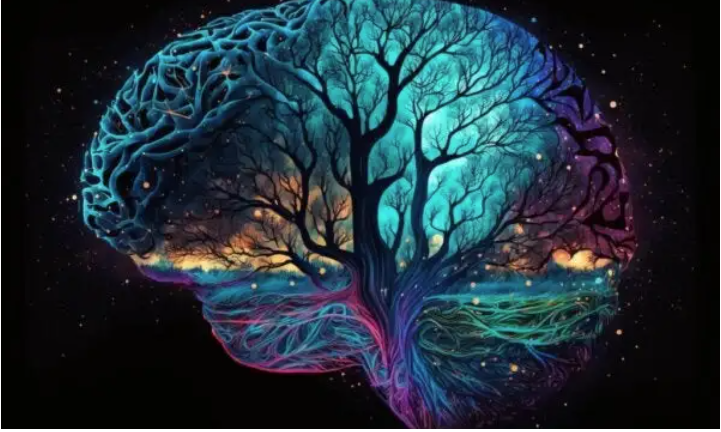The withdrawal of the intellect from the divine, religious ground as an authority of interpretation that enables communication with the sacred has created gaps of meaning in the spiritual life of modern man. The individual was left in the helplessness of not knowing whether the voices rising from the inner void belonged to himself, to malevolent or benevolent forces, to the devil, to the angel or to God.
In that polyphonic chorus, he began not to hear the deepest voice of the Creator whispering to him the purpose of his creation. It is difficult to listen to His voice! The color in His voice, the meaning in His words disappeared. The purpose of life of man, who was created with the will to give meaning, slipped away. Absolute meaning gaps eventually led to mental illness and, even more tragically, to suicide.
Human is a being of reason. However, if this intellect is not destined for the divine, if it is not divinely inspired, it is doomed to cling to its own individuality as a characteristic of the individual. The cutting of the cables to God leads to the conclusion that intellectually generated values bind only oneself.
Therefore, we have no certainty about the commonality of intellectually generated values, that they are the common truth. Since different individuals will be born from different biological structures, it is not possible to know for certain where the intellect of one intersects with the intellect of another. However, we can assume that we have common rational values. With modern philosophy, an insurmountable gulf has been created between reason/emotion, self/non-self. We can trace the roots of this attitude of modern philosophy-science back to Aristotle.
According to Aristotle, there was a complete harmony between the laws of existence and the laws of the mind; existence dictated its laws to our mind. Aristotle argued that in the world of concrete realities that surrounds us, we can explain categorized existence as a whole, both in particular and in universal, by linking, or separating, combining, classifying, and categorizing the knowledge of particular entities, which are manifested in the world of appearances by passing from the potential state to the actual (kinetic) state, with the knowledge we have in our minds about their concepts.
With this attitude, Aristotle not only enabled the development of natural sciences, but also took thought out of the realm of emotion and revelation and placed it under the command of reason. Henceforth, philosophy ceased to be an endeavor to make one’s life meaningful, a research, a mastery of life, and turned into an institution that investigates knowledge within the rules of logic.
The gap that Aristotle had opened between reason and emotion was bridged with the development of the natural sciences – and again – with the expulsion from modern philosophy of Aristotle’s ‘purposiveness’, which means ‘the orientation of every being towards the best possible state of itself’, the living nature Terra Madre turned into Terra Nullius, a pile of lifeless, purposeless objects. The disagreement between Galileo and the Church was not about the rotation of the earth around the sun, but about this issue.
With the Cartesian world design, everything was transformed in the human mind as bipolar – irreconcilable opposites such as man-nature, reason-faith, body-spirit, science-religion. In Descartes‘ duality of res-cogitans-res extansa, being was made dependent on the thinking possibilities of the subject, imprisoned in the mind, and being was imprisoned in the subject. “Nothing that is not subject to my knowledge, nothing that I do not evaluate in my mind, has no existential value.” With this idea, the concept of living being was completely expelled from philosophy, and instead was transformed into a rational knowledge produced by the reflexive thinking faculty (cogito) that could be folded onto the human mind as a machine that had to function perfectly.
The line of rationality, which we recognize in the world of Islamic philosophy with al-Ghazali, reached Andalusia (Spain) in the west of Islam to Averroism and spread to Southern Europe in the second half of the 1200s under the name of Averoism. The philosophers influenced by this movement emphasized rational knowledge over intuitive knowledge. The last great inheritor of this line is Descartes.
The basis of rationality in New Age philosophy was mathematics. Religious philosophers have always placed mathematics on a divine basis. We can see examples of this since Pythagoras. The mathematical explanation of the proportion in the universe is a great discovery. Galileo said about this: “There are two kinds of revelation: One is the Bible and the other is mathematics.” Einstein, whom we characterize as a religious scientist and philosopher, described mathematics as ‘perfect’, considering its perfection within the axiom system. An axiom is a basic proposition or fundamental belief on which beliefs that cannot be proved but can be proved are based. In philosophy, we owe the perfection of systems that are established with a consistency that leaves no gaps – this perfection reached its peak in Plato – to the axiomatic feature of mathematics. By adhering to the axioms, perfection can be achieved within the system, and when the axioms change, the system can be changed accordingly. These unprovable or unprovable fundamental beliefs are called ‘faith’ in religion and ‘postulates’ in geometry. And so, in the New Age, mathematics replaced the idea of ‘creation’ as a means of expression that would save us from relativity.
We are able to grasp the world with ‘reason’ through the possibility of mathematics, which is mutually contained in the idea of perfection of reason and in the structure of logic. This is how the commonality of thinking “I” subjects is achieved. Rationality is the basis on which the commonality between subjects rests.
The opposite of the concept of “perfection,” however, as well as the framework of “logic” and “mathematics” cannot be found in nature. These are ideas that are pre-programmed into our thoughts before any experimentation or birth. And God is the one who accomplishes this. It was because of this will that Socrates was able to teach a slave who had never seen mathematics to solve a geometry problem, and it was also because to this will that Einstein was able to learn everything there was to know about the physical universe using only a pencil and a ream of paper.
On the way to reaching certain and self-evident truths, at the last stage of doubt, Descartes, who said “I can no longer doubt what I doubt”, who folded his own subject over his own thought in front of his own subject, said “cogito ergo sum” and linked existence to complete thinking, to the thinking subject. So how did the ‘I’ then organize this disorganized view of the universe in his mind, how did he organize it? How was he able to derive the cause-effect, cause-effect link from this disorganized totality of events and phenomena of the universe? And how could he construct the world together with the self and the not-self?
Here Descartes divides the whole into the self and the non-self, and tries to investigate and analyze it by putting his own self in front of it. Descartes’ attempt to find himself and construct his world based on the self is called ‘self-analysis’ after Descartes. He embarks on a challenging adventure by dividing, extracting and dismantling his I to the last part and by resorting to doubt as a method in this dismantling. But the doubt here is not a doubt that expresses a psychic insecurity, but rather a logical/methodical doubt that perhaps challenges all the assumptions that have been acquired up to that point. Philosophy already works with this logical doubt.
“I doubt everything,” says Descartes: “I doubt all moral values, I doubt the existence of God, I doubt what I know, I doubt myself, I doubt what I see and what I don’t see, and I doubt everything… There is only one thing that is true among all these doubts, and that is that I doubt.” Descartes says: ‘I cannot doubt what I doubt’. To doubt what you doubt is a paradox, an error of logic, absurd. Thus, by destroying itself, it can reach the foundation to rebuild itself.
Thus, the modern mind, which objectified and otherized nature by dividing the evaluating self (ego) and the evaluated non-self (non ego), was caught up in the desire that it could reach universal, absolute, immutable laws with the confidence that science gave it. This claim also created the delusion that the same reason could also transform nature, society and human life, and objectify human beings. Thus, over time, this optimistic rationality was transformed into an instrument of political and hierarchical domination. The transformation of nature into an instrument without a will first resulted in the transformation of human beings from ends to means. With the same understanding, modern man placed himself at the center of an unreal absoluteness, at the center of the universe, and built technology as a means of struggle with nature and domination.
He went further and labeled societies that did not conform to his way of life as primitive, outdated and backward, claiming to represent the absolute and universal good. Rather than an effort of understanding, comprehension and discovery, his journeys to the other are aimed at gathering information about the other and transforming it into his own standardization. In Hegel’s terms, these explorations are operations to “I-ify” the other. The aim is not to serve human beings, but to profit from human labor and the market. It is the marketing of pleasures under the name of profitability by putting nature at the service of its master, man.
In the 17th century, the world was imprisoned in the rational mind of man, and with the same ‘discoveries’, the world ended up enslaving the other, destroying those it could not enslave with genocides, wars, assimilation policies, and in the 20th century, the world turned into a bloodbath with two world wars. At this level, even slavery was abolished not out of respect for human rights, but because it was costly. The same worldview shift that declared indigenous peoples as inferior and created apartheid, thus declared the Earth as dead, creating barriers between humans and the Earth through the illusion of Eco Apartheid. The false assumption that the Earth is dead inert matter has destroyed the living, biodiverse, vibrant Earth and turned it into a mine of “raw materials” for an inefficient and wasteful corporate, industrial system and a pool of industrial pollution.
The worldview that creates hierarchies between people and divides humanity on the basis of race, gender, religion and class has also created false anthropocentrism, self-described philanthropists who marginalize living beings for their own benefit and treat them as objects to be owned and manipulated.





